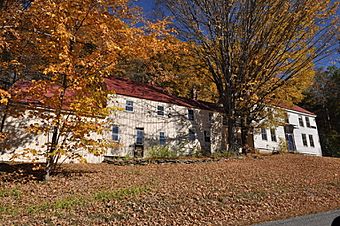Capt. James Morison House facts for kids
Quick facts for kids |
|
|
Capt. James Morison House
|
|
 |
|
| Nearest city | Parsonsfield, Maine |
|---|---|
| Area | 1 acre (0.40 ha) |
| Built | 1785 |
| NRHP reference No. | 78000335 |
| Added to NRHP | July 12, 1978 |
The Capt. James Morison House is a very old and special house in Parsonsfield, Maine. It was built around 1785 by Captain James Morison, who was a hero in the American Revolutionary War. This house is a great example of early American architecture. It's also famous for the amazing paintings on its walls, done by an artist named Jonathan D. Poor. Because it's so important, it was added to the National Register of Historic Places in 1978.
Contents
Exploring the Capt. James Morison House
This historic house is found in a quiet, rural part of Parsonsfield. It's a traditional New England farmstead. This means it has a main house, an attached section called an ell, a barn, and a shed. All these parts are connected together. They all have pointed roofs and sit on strong granite foundations.
What Makes This House Special?
The main house is a two-and-a-half-story wooden building. It has a classic look with five windows across the front. The front door is right in the middle. It has a fancy cover over it that was added later. The ell, which connects the house to the barn, is two stories tall. The barn itself is made of wooden boards and battens.
Inside the Historic Morison House
Inside the main house, you can still see the original woodwork from when it was built. The central staircase has beautifully carved railings. But the most exciting part is on the walls! The stairwell and the hallway upstairs are decorated with murals. These are large paintings directly on the walls.
These murals were painted by Jonathan D. Poor. He was a well-known "itinerant artist." This means he traveled around painting murals in different homes. He learned his painting skills from his uncle, Rufus Porter, who was also a famous artist. What makes the paintings in this house extra special is that they have Poor's signature on them!
Meet Captain James Morison
James Morison, whose family came from Scotland, moved to Parsonsfield in 1785. This was the same year the town officially became a town! Captain Morison was a brave soldier in the American Revolutionary War. He worked for General Charles Lee during the war. He even fought in the 1776 New York and New Jersey campaign. Sadly, he was wounded in the 1777 Battle of Brandywine.
Later, a man named Seth Chellis owned the house. He had one of the biggest farms in the area in the mid-1800s. It's thought that he might have been the one who added the beautiful murals and other stylish touches to the house.



